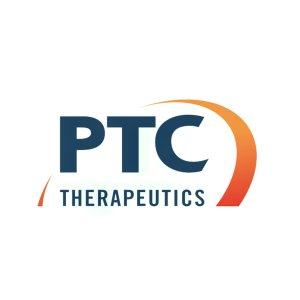PTC Therapeutics Announces Results from MIT-E Clinical Trial of Vatiquinone for the Treatment of Mitochondrial Disease Associated Seizures
- None.
- None.
Insights
Analyzing...
SOUTH PLAINFIELD, N.J., June 29, 2023 /PRNewswire/ -- PTC Therapeutics, Inc. (NASDAQ: PTCT) announced today that the MIT-E trial of vatiquinone for the treatment of mitochondrial disease associated seizures (MDAS) failed to achieve its primary endpoint of reduction in observable motor seizures. The study showed evidence of treatment effect in reducing seizure frequency in the overall study population and in the largest subgroup of children with Leigh syndrome, in whom benefit was also observed in the key secondary endpoints of occurrence of status epilepticus and disease-related hospitalizations.
"We are incredibly grateful to the patients, their families and our investigators who participated in this important study," said Dr. Matthew Klein, Chief Executive Officer of PTC Therapeutics, Inc. "While we are disappointed with the results of the study, we hope that there are learnings that can benefit the development of other therapies for patients with mitochondrial disease, who remain without approved treatments for this highly morbid and fatal set of diseases."
The MIT-E study is a double-blind, placebo-controlled study of vatiquinone in pediatric patients with genetically confirmed mitochondrial disease and associated refractory seizures. The study enrolled 68 children at study sites worldwide. The study included a 24-week placebo-controlled phase followed by a 48-week open-label phase. The primary endpoint was the reduction in observable motor seizures during the 24 weeks placebo-controlled phase. All subjects who completed the placebo-controlled phase were eligible to participate in the open-label phase of the study.
While the MIT-E study results do not support the advancement of vatiquinone for the treatment of MDAS, PTC continues to plan to discuss the results of the MOVE-FA trial of vatiquinone for the treatment of Friedreich ataxia with regulatory authorities based on the important signals of clinical benefit on key subscales of the mFARS, such as upright stability.
About Vatiquinone
Vatiquinone is an investigational new drug that targets 15-lipoxygenase, a regulator of key energetic and oxidative stress pathways. Vatiquinone has been evaluated in a number of clinical studies and has demonstrated an impact on mortality risk and a number of neurological and neuromuscular disease symptoms.1,2,3 The treatment also has extensive safety data, with the longest duration of exposure being over 10 years.
About PTC Therapeutics, Inc.
PTC is a global biopharmaceutical company focused on the discovery, development and commercialization of clinically differentiated medicines that provide benefits to patients with rare disorders. PTC's ability to innovate to identify new therapies and to globally commercialize products is the foundation that drives investment in a robust and diversified pipeline of transformative medicines. PTC's mission is to provide access to best-in-class treatments for patients who have little to no treatment options. PTC's strategy is to leverage its strong scientific and clinical expertise and global commercial infrastructure to bring therapies to patients. PTC believes this allows it to maximize value for all its stakeholders. To learn more about PTC, please visit us at www.ptcbio.com and follow us on Facebook, Instagram, LinkedIn and Twitter at @PTCBio.
For More Information:
Investors:
Kylie O'Keefe
+1 (908) 300-0691
kokeefe@ptcbio.com
Media:
Jeanine Clemente
+1 (908) 912-9406
jclemente@ptcbio.com
Forward-Looking Statements:
This press release contains forward-looking statements within the meaning of The Private Securities Litigation Reform Act of 1995. All statements contained in this press release, other than statements of historic fact, are forward-looking statements, including statements with respect to the future expectations, plans and prospects for PTC, including with respect to the expected timing of clinical trials and studies, availability of data, regulatory submissions and responses and other matters, future operations, future financial position, future revenues, projected costs; and the objectives of management. Other forward-looking statements may be identified by the words, "guidance", "plan," "anticipate," "believe," "estimate," "expect," "intend," "may," "target," "potential," "will," "would," "could," "should," "continue," and similar expressions.
PTC's actual results, performance or achievements could differ materially from those expressed or implied by forward -looking statements it makes as a result of a variety of risks and uncertainties, including those related to: the outcome of pricing, coverage and reimbursement negotiations with third party payors for PTC's products or product candidates that PTC commercializes or may commercialize in the future; significant business effects, including the effects of industry, market, economic, political or regulatory conditions; changes in tax and other laws, regulations, rates and policies; the eligible patient base and commercial potential of PTC's products and product candidates; PTC's scientific approach and general development progress; the sufficiency of PTC's cash resources and its ability to obtain adequate financing in the future for its foreseeable and unforeseeable operating expenses and capital expenditures; and the factors discussed in the "Risk Factors" section of PTC's most recent Annual Report on Form 10-K, as well as any updates to these risk factors filed from time to time in PTC's other filings with the SEC. You are urged to carefully consider all such factors.
As with any pharmaceutical under development, there are significant risks in the development, regulatory approval and commercialization of new products. There are no guarantees that any product will receive or maintain regulatory approval in any territory, or prove to be commercially successful.
The forward-looking statements contained herein represent PTC's views only as of the date of this press release and PTC does not undertake or plan to update or revise any such forward-looking statements to reflect actual results or changes in plans, prospects, assumptions, estimates or projections, or other circumstances occurring after the date of this press release except as required by law.
References:
- Hinman A, et al. PloS one. 2018;13:e0201369.
- PTC. EPI-743 Pre-Clinical Data Deck.
- Kahn-Kirby AH, et al. PloS one. 2019;14:e0214250.
![]() View original content:https://www.prnewswire.com/news-releases/ptc-therapeutics-announces-results-from-mit-e-clinical-trial-of-vatiquinone-for-the-treatment-of-mitochondrial-disease-associated-seizures-301867528.html
View original content:https://www.prnewswire.com/news-releases/ptc-therapeutics-announces-results-from-mit-e-clinical-trial-of-vatiquinone-for-the-treatment-of-mitochondrial-disease-associated-seizures-301867528.html
SOURCE PTC Therapeutics, Inc.







